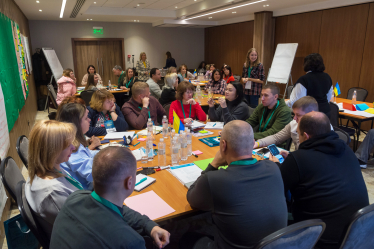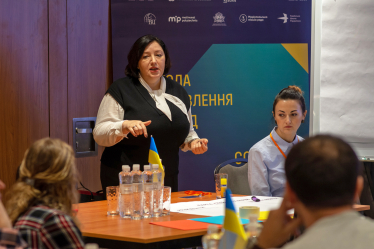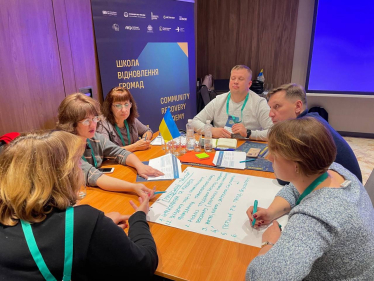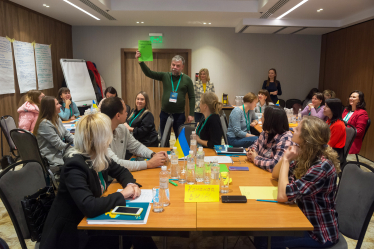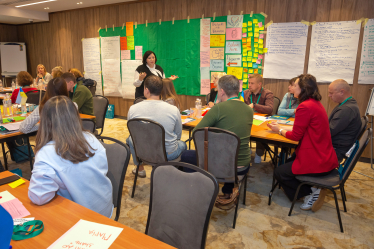In 2024, the losses inflicted on Ukraineʼs infrastructure by the full-scale war initiated by Russia reached over $155 billion, according to the KSE Institute. The most significant destruction occurred in the eastern and southern regions of the country, including Donetsk, Luhansk, Kharkiv, Zaporizhzhia, and Kherson. However, the damages extend beyond destroyed homes and devastated infrastructure; they encompass deep stagnation in these regions, disrupted economic and social ties within communities, and a palpable fear among residents to return, along with hesitation from potential investors. Recovery requires not only funding and professional architectural reconstruction plans but also motivation for those who will undertake the rebuilding efforts. To effectively and swiftly engage people in the recovery process, Ukraine must create conducive conditions for them while establishing new benchmarks for communities and regions.
The Community Recovery Academy, founded by the Association of Ukrainian Cities and the NGO Mariupol Reborn, unites this effort into a single vector aimed at the effective recovery of Ukraineʼs settlements. This platform, as detailed in this article, will educate Ukrainians on how to rebuild towns, communities, and villages rationally.
Challenges of Community Recovery: How to Identify and Address Them
Effective modernization of Ukraine, along with the restoration of peopleʼs lives and the overall society, hinges on the development of communities. However, before embarking on the recovery process, community leaders and residents must clearly articulate the issues that need to be addressed and identify potential pitfalls that may arise.
Anatoliy Fedoruk, the mayor of Bucha – a city where the Russian forces inflicted damage amounting to $1.5 billion by destroying over 4,000 facilities – notes that a lack of funding hinders rapid recovery efforts. The destruction of thousands of budget-generating enterprises in the Bucha community has led to resource shortages for replenishing the local budget. He emphasizes that simultaneous financing for all existing needs would allow for the immediate recovery of all social and residential infrastructure. Despite these challenges, Fedoruk adds that Bucha is making strides in recovery and attracting international investment.
Similarly, Vadym Boichenko, the mayor of Mariupol, highlights the most significant challenge faced by the Mariupol community at the beginning of the recovery process: the lack of reconstruction expertise. «We need to do better than before. But how do we achieve that, and where do we start? Without this understanding, it’s impossible to establish a sustainable process,» says Boichenko. He also points out that the occupation of the city introduces new challenges, particularly in assessing the damages when access is restricted.
What steps can be taken to address these challenges? For instance, the Mariupol community has turned to international examples, particularly the case of Warsaw’s recovery after World War II. «The world has the necessary expertise; we just need to articulate our request correctly. We must build cooperation with international partners and enhance communication among communities in Ukraine. European cities and international partners are willing to share their expertise, but the primary responsibility lies with our communities. We must formulate requests, learn, and exchange experiences with each other,» emphasizes Boichenko.
Buchaʼs mayor, Anatoliy Fedoruk, shares a similar viewpoint. He believes that to create a favorable public environment in a community affected by war, there must be consolidation among citizens, transparency in governance, and accountability to the public while avoiding the politicization of processes. Additionally, there should be a commitment to rebuilding in a way that improves the previous state before the destruction occurs.
«The most difficult time was right after the de-occupation,» says Fedoruk. «There were no restoration mechanisms in place, and together with the government and neighboring communities, we had to figure out how to rebuild the city on our own. Eventually, we received state mechanisms that provide a systematic approach to recovery: eRecovery, UNITED 24, and Recovery.»
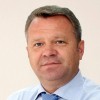
Anatoliy Fedoruk
Mayor of Bucha
«After the de-occupation of Bucha, peopleʼs desire to return to their homes was so evident that from the very first day following the recapture, we started restoring everything we could do on our own. We approached these challenges comprehensively, understanding that you cannot restore housing stock without also revitalizing social infrastructure, including hospitals, schools, and kindergartens. Ultimately, on September 1, 2023, we reopened 15 schools and 15 preschool facilities. Today, we have restored 97% of the destroyed residential and social facilities in Bucha.»
Natalia Yaresko, public figure and entrepreneur, co-founder of Horizon Capital, and former Minister of Finance of Ukraine, notes that international partners genuinely support Ukraineʼs large-scale recovery, which begins at the community level. This is a so-called «bottom-up» recovery, where communities themselves decide how to live, what and where to build, and what programs to develop for these purposes, explains Yaresko. She cites Denmark as an example, which is working with a community in the Mykolaiv region, having allocated financial assistance in September to help them through the autumn-winter period and to restore critical social infrastructure. This collaboration unites the efforts of the government, residents, authorities, and businesses. According to Yaresko, the key to successful future recovery lies in the unity of community residents, local authorities, and foreign donors.
In her view, the main challenge for communities in recovery is the lack of mechanisms for obtaining loans and grants directly from international financial organizations, such as the EIB or EBRD. However, the public figure says that when the government optimally allocates funds from credit programs for communities, the recovery process accelerates.

Natalia Yaresko
Public Figure, Former Minister of Finance of Ukraine
«For effective recovery, communities need to build their own experience while analyzing foreign cases. They need to learn how to formulate and present recovery projects not only in Ukrainian but also in English – this way, international investors will be more inclined to finance the reconstruction of regions. Technical and consulting assistance in this regard is precisely what the Community Recovery Academy provides. The project enables individuals interested in rebuilding and modernizing Ukraine to gain both domestic and international experience.
To encourage Ukrainians to return, it is crucial to understand what they will need and to rebuild accordingly. This planning must happen now without waiting for victory. A national strategy is needed to effectively utilize available resources, along with targeted regional inclusive projects that comply with European standards. Furthermore, synergy among businesses in the regions is essential; without entrepreneurs, community life will come to a halt.»
Prospects and Vision of the Community Recovery Academy
The Community Recovery Academy was launched in collaboration with the Association of Ukrainian Cities and the NGO Mariupol Reborn in partnership with Metinvest and SCM.
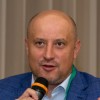
Oleksandr Slobozhan
Executive Director of the Association of Ukrainian Cities
The project is part of the comprehensive efforts by the Association of Ukrainian Cities to assist residents of temporarily occupied and liberated territories and to facilitate community recovery after victory. Within the Association, there is a dedicated section that collaborates with communities to identify issues requiring resolution at the national level. This includes support for internally displaced persons (IDPs) and the preparation of documentation for community restoration. Additionally, the Municipal Recovery Center has been established to assist communities in preparing the necessary documents for securing funding for projects.
The Community Recovery Academy concept has been developed based on the Mariupol Reborn project and global best practices, says Natalia Yemchenkо, Director of Communications at SCM and a member of the Supervisory Board of the NGO Mariupol Reborn. The Mariupol community has accumulated this expertise through its involvement in the Mariupol Reborn initiative.
«When we launched ʼMariupol Reborn,ʼ our goal was to prepare both the community and the city council team, as well as ourselves as a business, for the recovery following the liberation of Mariupol. We decided to implement 10 projects and allocated 60 million UAH for this purpose. The Community Recovery Academy was one of these projects,» says Ms. Natalia. However, this is not just a story about education. The project has emerged from the pain of communities experiencing war and their yearning for reconstruction. It is a shared journey of recovery, a platform where communities from all over Ukraine can exchange experiences and knowledge in preparation for the future.
The materials taught at the Academy address not only Mariupolʼs specific challenges. The experience developed here will create universal expertise that will assist communities across Ukraine in obtaining investments from European partners, emphasizes Natalia Yemchenkо.
The Academy is already operational, having selected 37 communities out of over 100 applicants through a competitive process. Expert-level training is currently underway, and as a result, these communities will gain unique hands-on experience from leading global experts and knowledge on how to utilize investments effectively.
Additionally, the Community Recovery Academy, in collaboration with the «Heart of Azovstal» project, is implementing initiatives to support and adapt veterans to post-war life. This involves training specialists across communities in Ukraine who will care for veterans, create job opportunities, and work with them at various levels. This is the first initiative of its kind in Ukraine, modeled on experiences from Western countries, particularly the United States.
«Business is already working towards the recovery of Ukraine, so communities must be ready to engage in rebuilding without postponing post-war reconstruction. The Community Recovery Academy is helping to prepare personnel who understand that rebuilding the country involves not just restoring buildings, but also revitalizing lives, memories, and communities,» summarizes Natalia Yemchenkо.
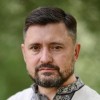
Vadym Boichenko
Mayor of Mariupol
«When asked, ʼWhy is it necessary to begin the recovery process now, without waiting for the war to end?ʼ the cities that have already navigated this path provided the answer. When we speak about community recovery, we must look beyond rebuilding houses, roads, hospitals, and schools; we must focus on the dilemma of how to bring people back to their cities and keep them there. People are Ukraineʼs most valuable asset, and we must do everything possible to preserve it. Residents need to want to return to their city. They need to envision their future in liberated communities like Irpin and Bucha and eventually in Mariupol, Bakhmut, Rubizhne, and other towns, to feel motivated to come back. To achieve this, we must start preparing for revival right now, as time will be of the essence later on.»

Project Overview: Community Recovery Academy
The «Community Recovery Academy» was established by the Association of Ukrainian Cities and the NGO «Mariupol Reborn.» This project is implemented in collaboration with the Association of Ukrainian Cities with the support of the Council of Europe and the Government of the United Kingdom as part of the UK International Development program and the International Republican Institute (IRI Ukraine), in partnership with Metinvest and SCM.
The «Community Recovery Academy» aims to train representatives from 25 communities across Ukraine that have been affected by the war. The training will run from September 2024 to March 2025 and will feature a blended format, with 60% of the content delivered online and 40% in offline sessions.
The curriculum of the Academy, developed by experts from the National University of Kyiv-Mohyla Academy and Metinvest Polytechnic, consists of four modules:
- Community strategy — at the national and international levels;
- Economic modeling, city, and territory recovery;
- Community retention, repatriation of residents, and conflict resolution;
- Projects, resource allocation, and attracting investments.
The modules will include lectures from Ukrainian and international experts, practical case studies, methodological materials, forums, and workshops featuring guest experts. Additionally, the Academyʼs students will gain access to two video courses on the educational platform Prometheus.
As a result of the training, each participating municipal team will develop a vision for community recovery, which will provide practical solutions for the future development of their areas. The most diligent graduates will continue their studies at leading higher education institutions in Ukraine and have the opportunity to obtain a state diploma.
Strength in Unity: Partners Supporting the Community Recovery Academy
At Metinvest and SCM, owned by Rinat Akhmetov, the focus is on investing in Ukraineʼs recovery now because they believe in the countryʼs potential and the importance of collaboration with cities. This investment provides communities the opportunity to develop city recovery strategies and project documentation, essential steps that will assist them in securing funding for restoration from international partners.
The project has already garnered support from the Government of the United Kingdom as part of the UK International Development program and the International Republican Institute (IRI Ukraine), along with backing from Ukrainian businesses – specifically Metinvest and SCM. Educational partners include Metinvest Polytechnic and the National University of Kyiv-Mohyla Academy, and partnerships are also being formed with the University of Maryland and the Massachusetts Institute of Technology.
The UK Foreign, Commonwealth & Development Office (FCDO) supports the Community Recovery Academy. It believes in a decentralized approach to rebuilding and recovery, driven by initiatives led by those who understand the needs of affected communities and the people residing within them.
«When we learned about the projects aimed at restoring Ukrainian infrastructure, we recognized that they aligned with our values, and we decided to support these initiatives. The Community Recovery Academy is an innovative project that facilitates the recovery and reconstruction of Mariupol, as well as other areas and communities across Ukraine adversely affected by the horrific aggression against the country. This process must occur inclusively and following local needs. We must start this process now, as recovery and rebuilding are integral parts of victory,» emphasize FCDO representatives.

Natalia Yemchenko
Communications Director at SCM, Member of the Supervisory Board of Mariupol. Reborn
«The Community Recovery Academy serves as a platform where communities from across Ukraine can exchange experiences and knowledge in preparation for the future. We cannot postpone post-war reconstruction any longer. Therefore, the Academy is training specialists who understand that rebuilding Ukraine is not just about restoring buildings; itʼs about revitalizing lives, preserving memories, and strengthening communities.
The roles of Metinvest and SCM as businesses extend beyond financial support. We share our successful case studies, mainly through our involvement in the Metinvest Polytechnic project. The first course of the Academy, ʼProject Management for Community Recovery,ʼ based on Metinvest case studies, reflects our practical experience in training professionals that yields real results.»
Вы нашли ошибку или неточность?
Оставьте отзыв для редакции. Мы учтем ваши замечания как можно скорее.

